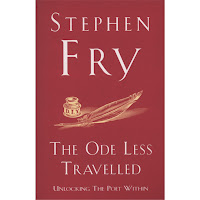Poetry Process: Element 2 - Studying Poetic Technique and Theory.
 ...sounds like a really boring title for a really boring and heavy part of my poetry process.
...sounds like a really boring title for a really boring and heavy part of my poetry process.But it's not. Honest.
So, where to begin?
From the beginning I wanted to expand my knowledge, not only of the technical, nuts and bolts side of things, but also catch up a bit on the history and movements of poetry, the watershed essays and break out poets/poem.
To tap into my/our poetic heritage.
The Basic Approach
Within this study component I followed this basic approach*:
- Read the text (essay, chapter/section of a book) or listen to a podcast
- Take notes
- Reflect
- Asking myself, do I agree?
- Does this conflict with what else I have read?
- Can I see what they are talking about (Theory/Technical Aspects)?
- Can I think of other examples of what they are talking about(technical aspects)?
- Do I, can I do this in my own poetry (technical aspects)?
It became a conversation with myself that continues to this day.
The Texts
Now when I began, I was working as a supply teacher (substitute/emergency etc) and money was tight. You can spend thousands of dollars on poetry technique and theory books but it's not vital. I started with online resources.
Starting points for Theory
The first of these was The Poetry Foundation and specifically their collection of Essays on Poetic Theory, there's a couple of months worth of reading there no doubt. I found myself learning not just about poetry mind you, but larger societal movements as well.
The first of these was The Poetry Foundation and specifically their collection of Essays on Poetic Theory, there's a couple of months worth of reading there no doubt. I found myself learning not just about poetry mind you, but larger societal movements as well.
Starting points for Technique
There are hundreds if not thousands of articles online, written by a variety of people from those simply regurgitating, to those who have a much keener insight. My Books On Poetry page lists some interesting books that could get you started, most of them should be in your library and all bar one are are entry level reads.
I will say that, there are a multitude of How to Write a Poem books, complete with exercises and advice, but none that I have come across with the depth of Mary Kinzie's A Poet's Guide to Poetry. As an example of how fine this book goes, it had me considering word and letter choice in my poems for the individual effect of the sound a single letter can have on proceeding words.
Another good place to start brushing up some technical skills might be the aforementioned Poetry Foundation at the Learn page.
I could give you lists of books, you could even recommend some in the comments, but I loved the organic approach that grew from this start. I could follow my own interests, divert off on tangents, create my own canon.
Have you got any essays or texts that spoke to you? Feel free to list them in the comments. The Next part in this series will be the element Writing Poetry
* Now, I have outlined it here for ease of understanding but this is a organic process, our minds don't necessarily work this logically
Poetry Process Series
- Reinvigorating my process or Year of Poetry 2.0
- Poetry Process - Element 1: Close Reading and Ana...
 In Magpie Tales Australian poet SB Wright reveals a keen eye for capturing both people and places, his deft imagery transports the reader effortlessly from rural Australia and beyond. The pieces within explore a changing inner landscape too, where the contested terrain of small town identities and national issues are played out in clear, lyrical verse.
In Magpie Tales Australian poet SB Wright reveals a keen eye for capturing both people and places, his deft imagery transports the reader effortlessly from rural Australia and beyond. The pieces within explore a changing inner landscape too, where the contested terrain of small town identities and national issues are played out in clear, lyrical verse.
Magpie Tales is his first poetry collection.
Available in print: Amazon Aus, US / Book Depository / Booktopia / Bookworld / Barnes & Noble / Fishpond
Signed Copies: On request
Available in print: Amazon Aus, US / Book Depository / Booktopia / Bookworld / Barnes & Noble / Fishpond
Signed Copies: On request

Comments
Post a Comment